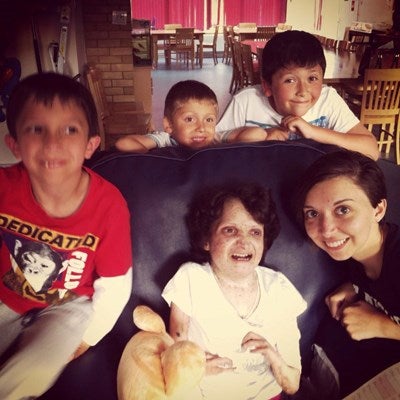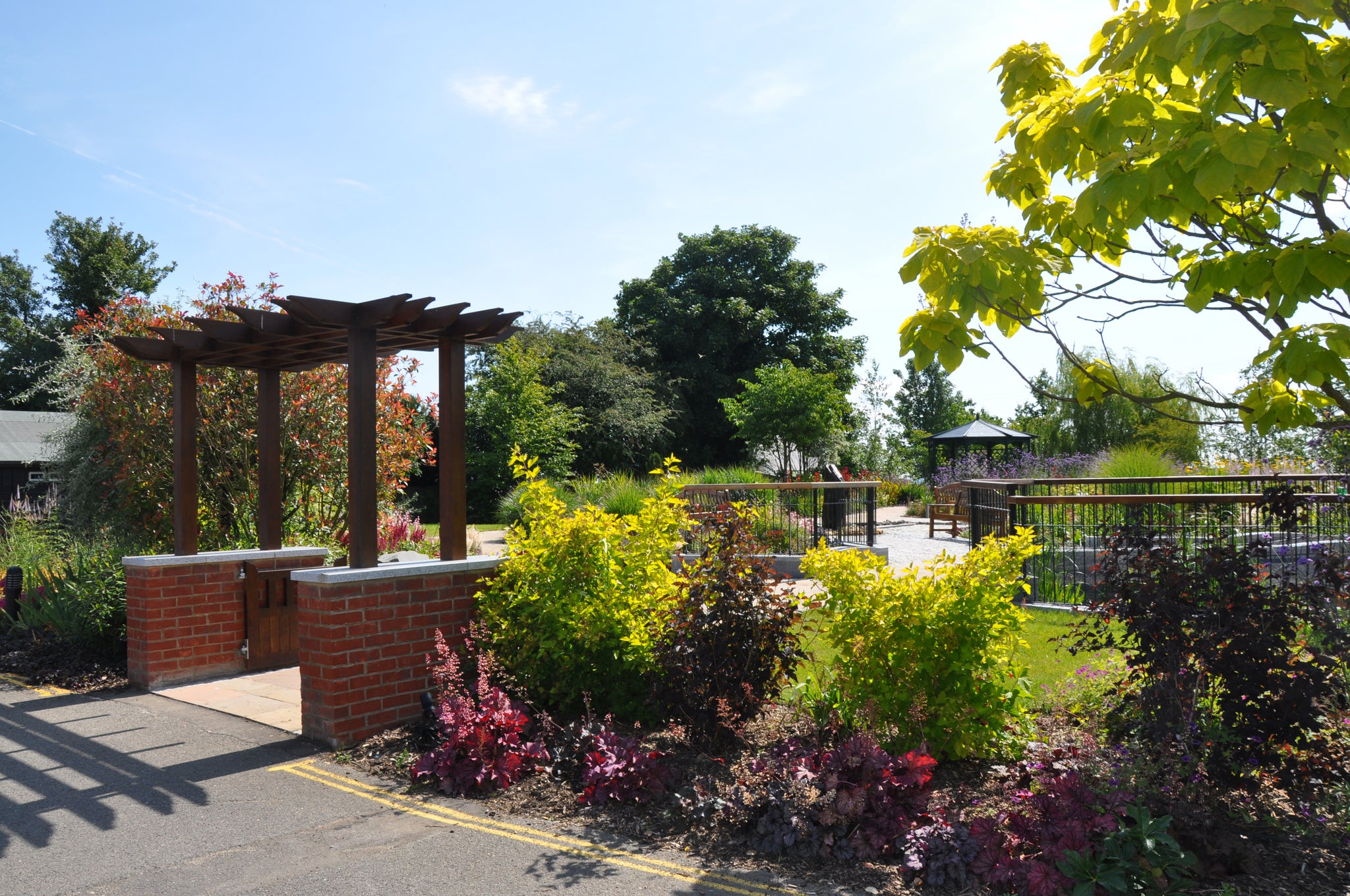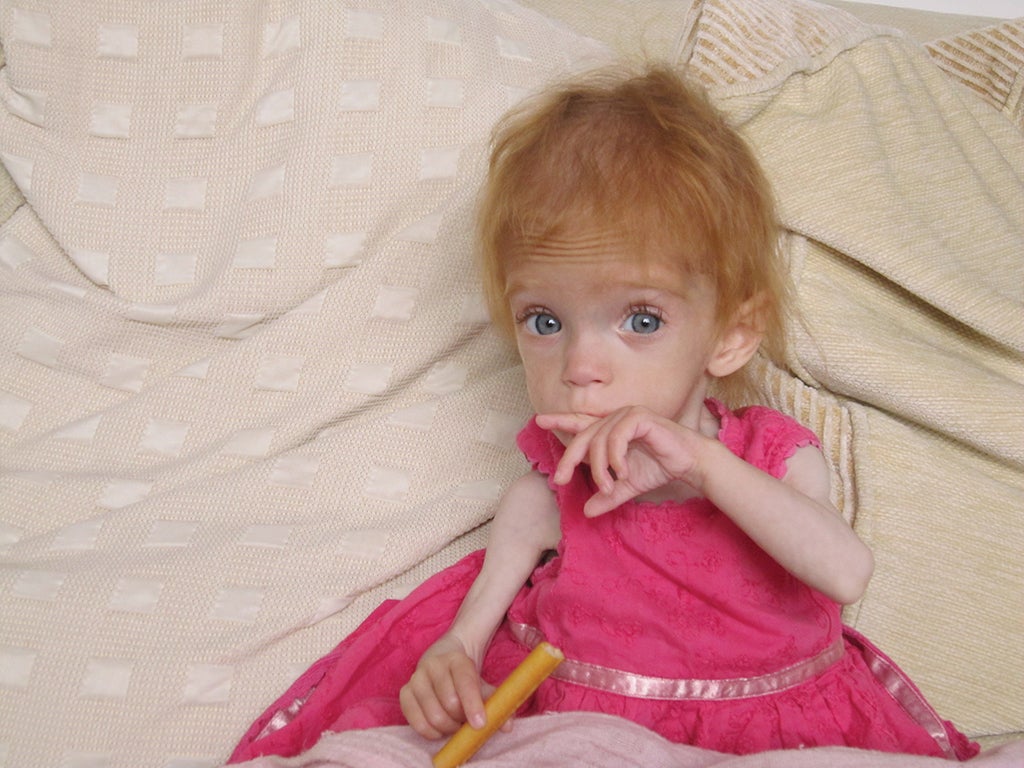Christmas at a children’s hospice: Adding life to days when days cannot be added to life
For some children, this will be their last Christmas. But the right support can make a huge difference to families
Never before have I cried during an interview. It isn’t exactly professional behaviour. But I defy even the most hard-bitten of journalists to listen to Sarah Cohen’s story of the life and death of her adored daughter Charlotte without cracking. We wept as mothers together.
Christmas is a desperately difficult time for families like Sarah’s. And for some this Christmas will be their last spent with a much loved dying child, so it has to be as good as it can be and they need even more support at this time of year than usual.
Sarah and I are sitting in the spacious, peaceful sitting room which leads into the elegant oast house style multi-faith chapel at Demelza Children’s Hospice in Sittingbourne, Kent. Charlotte Craggs, 18, Sarah’s daughter, died just along the corridor from here in October last year.
Charlotte was born with multiple disabilities which early 1990s antenatal screening failed to detect. Eventually diagnosed with Rothmund Thompson Syndrome (RTS), a rare genetic disorder, she had no thumbs, radii in her forearms, or knee caps along with other skeletal disorders. She also had an imperforate anus which had to be repaired as soon as possible so her first Christmas, like many subsequent ones, was spent in hospital – Great Ormond Street, that first time. When she was six months old Sarah’s suspicion that Charlotte was profoundly deaf was confirmed.
At the beginning a Great Ormond Street doctor told Sarah that many hospital appointments and operations lay ahead. “It was an understatement” says Sarah simply, admitting to me, when I ask the most sensitive of all questions, that yes, she would probably have terminated the pregnancy had she known just how many problems her daughter would face. “You couldn’t wish on any child what Charlotte had to suffer,” she says, welling up, not many minutes after we’d started talking. In the event, of course, she and the rest of her large extended family – with the support of many charities and organisations including Demelza – loved Charlotte deeply and cared for her devotedly to the very end.
Surgery gave Charlotte, who was unable to walk, thumbs created from one of her other digits, which meant that she had some manual dexterity and could grip. Charlotte was mentally alert and able. An excellent special needs primary school ensured that she could read and she learned British Sign Language as did Sarah and other family members. She loved swimming, cooking and Hello Kitty.

At age 10 the family made a difficult decision to let her go to a boarding school as a weekly boarder where she became a really fluent signer. “She loved it at Royal School for Deaf in Margate with its wonderful team of staff.” recalls Sarah. “It meant she could have proper friends and be a teenager. She’d come through most of the surgery she needed by then and since RTS doesn’t, of itself, shorten life we honestly thought she was OK. And for several years she was.”
During that stable time, Sarah – working all along as a police officer - and now in a new marriage, bore three more children. Matthew, now 11, Alex, eight and Oliver, five, were half brothers for Charlotte. She also had a very attentive older brother, Adam, and sister, Amy, from Sarah’s first marriage. And Sarah is full of stories and memories of how each of her five siblings related to, and loved, Charlotte by visiting and spending time with her as often as possible.
Then the blow fell. RTS means increased susceptibility to skin and bone cancer and in 2011 she developed tumours in her shoulder and knee which meant surgery followed by relentless chemotherapy. Ever feisty, Charlotte (once known to line the night staff up at 3am to teach them some signing from her hospital bed) said she didn’t mind losing her hair as long as she could have a purple wig. So she did.
Enter Demelza Hospice Care for Children which opened in Sittingbourne in 1998 and Eltham in 2009 and works with children with life limiting and life threatening conditions, and their families, across Kent, East Sussex and South London – about 800 families in total at present. Its truthful, but upbeat, slogan is: “Adding life to days when days cannot be added to life.”

From time to time Charlotte would move in to Demelza’s 10 bedded house at Sittingbourne for respite care in one of the beautiful, tasteful bedrooms in which every possible adaptation makes life easier and independent. She loved the art room, the music room, the big deep hydrotherapy pool (which siblings can come and swim in too). Best of all she liked the teenage room - more formally known as “the inclusion zone for young adults” – a delightful space with comfy seating and a kitchen designed by the young people themselves. There they can play music, chat and just be teenagers. Outside there’s a magnificent play area for younger children and, much appreciated by people like Sarah and her family now, a garden of tranquility for quiet thought or grief.
Charlotte caught chicken pox, probably because of her chemotherapy-weakend immune system. She had it very badly and it made her very ill. She also, almost inevitably, picked up C Difficile, a serious infection. Then, variously intubated for most of her life, she developed evident stomach and bowel problems. Fissures causing blockages were diagnosed in the summer of 2013 and, after a major bleed, time spent in critical care and much to-ing and fro-ing Sarah was told there was nothing more which could be done as Charlotte gradually grew thinner and weaker. An end of life pathway plan was drawn up. Transfusions and other treatments were stopped.
Armed with two large bags of compelling pictures and cuttings, Sarah, at his point produces a photograph of a pitifully emaciated, pock marked, bed-ridden Charlotte taken two days before her death at Demelza. Charlotte is cooking in bed – the staff had brought ingredients to her because she wasn’t well enough to get to the kitchen. She also shows me a moving shot of Charlotte in bed being visited by her brother Adam on leave from the Navy. He has his arm round Charlotte and both are trying to smile. “If you look carefully though you can see that they are both crying” says Sarah. “They knew it was the last time they would see one another.
Advised and supported by Demelza, Sarah explained to Charlotte, who was sleeping more and more, that she would soon die. “I wrote her a letter and then read it with her – through signing – to help her understand” she says.” And we promised her everything she wanted – and gave her as much as we possibly could. We spent a lot of time looking at photographs and reliving her many happy memories too.”
Charlotte loved Chinese food and Ken Lom’s cookery programmes. Gently told that she probably wouldn’t be around to celebrate her 19th birthday in December last year she was excited by the idea that the family would eat one in her memory. “When it came to it everyone did it!” says Sarah, mentioning the whole of the Royal School for the Deaf and the Kent village in which she lives who all ate a Chinese meal that day.
Since Charlotte’s inevitable death on 10 October 2013, Demelza has continued to support Sarah and her family. This service continues for three years after the death of a child.
Demelza Hospice Care costs £9 million a year to run, 88 per cent of which comes from donations and fund raising. in 2013, 80 per cent of the money raised was spent on providing direct care for children and families. Only 20 per cent was used for fundraising, volunteers and administration.
1,300 volunteers help with running shops, fundraising and doing many jobs such as gardening, housekeeping and driving. There are at least 1000 more families in Kent, East Sussex and South London which could benefit from Demelza’s services if it had more funding.

You can help Demelza this Christmas by contributing to their appeal - read more about Keira's story here, and how to donate.
So what exactly do they do? Among the many thoughtful things Sarah mentions are that they can store a laid out body in a 'cold room' so that families can visit in a welcoming and familiar environment rather than having to use an impersonal undertaker’s chapel of rest. There’s a pretty conservatory where staff will help families to make funeral arrangements – with a non-stop supply of sandwiches and hot drinks for as long as necessary. “At Charlotte’s funeral there was a known Demelza staff member to support each child so that they had someone there for them apart from us” says Sarah, telling me that Demelza also helped organise a family holiday in Gloucestershire where they could all simply be quietly together in a house for a week.
Sarah also mentions the parents’ Bereavement Day and the Demelza art therapy which two of her young sons are currently benefiting from. The Candle Light Walk at Demelza, in which people walk round the local lanes with candles and take part in a service in the chapel, this year fell on 7 December, which would have been Charlotte’s 20th birthday.
For more information on Demelza's Unique Gift Appeal this Christmas, visit https://demelza.org.uk/
Join our commenting forum
Join thought-provoking conversations, follow other Independent readers and see their replies
Comments
Bookmark popover
Removed from bookmarks